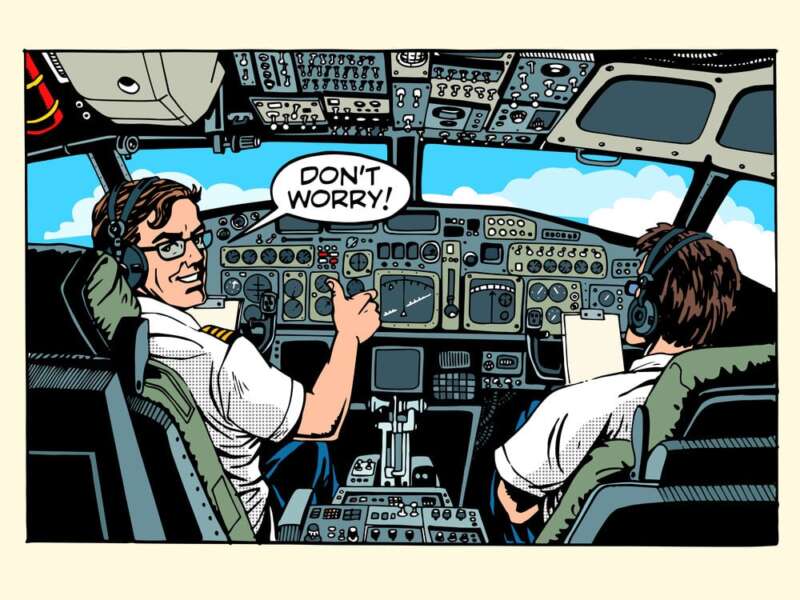Pilot Calms Anxious Flyers After Tragedy
Do the friendly skies feel more like a menacing expanse? The fear of flying is a surprisingly common anxiety, but in a world increasingly reliant on air travel, it's a hurdle many are determined to overcome. From viral videos of reassuring pilots to specialized services offering personalized flight briefings, the resources available for anxious flyers are evolving to meet this growing need.
The recent collision between a regional jet and a military helicopter near Washington D.C. understandably heightened anxieties for many air travelers. The incident, investigated by the Federal Aviation Administration (FAA), served as a stark reminder of the inherent risks of air travel. Yet, amidst the unease, stories of compassion and reassurance emerged. One such story features an American Airlines pilot who, just a day after the tragic accident, addressed his passengers with a heartfelt message of comfort and safety before takeoff. This act of empathy, captured and shared on TikTok by passenger Leighton Mixon (@leighterhaters), resonated with countless anxious flyers, highlighting the crucial role pilots can play in alleviating passenger fears.
| Name: | Peter Cappio (Example - Information not readily available in the provided text, used as a placeholder for illustrative purposes.) |
| Profession: | Commercial Airline Pilot, Founder of a service for anxious flyers |
| Specialization: | Flight anxiety counseling, personalized flight briefings |
| Related Incident: | American Airlines pilot's comforting message post D.C. mid-air collision |
| Reference: | Federal Aviation Administration (FAA) (Example link related to aviation) |
The pilot's message, delivered on American Airlines flight 1044 from Jacksonville to Miami, arrived at precisely the right moment for Mixon and likely many others onboard. In a world saturated with instant news and often graphic details, the simple act of acknowledging shared anxieties and reaffirming commitment to safety proved remarkably powerful. This incident underscores a broader trend: the increasing recognition of flight anxiety and the proactive steps being taken to address it.
Shibani Kaur Gupta, a line training captain for Wizz Air, emphasizes the importance of communication in managing flight anxiety. Speaking to Metro, she advised anxious flyers to reach out to the crew, highlighting that open dialogue can significantly reduce stress. "It really helps if you can talk to the crew," she explained. This sentiment echoes the core principle behind services like "Dial a Pilot," which connects anxious flyers with vetted and certified pilots for $50. These consultations offer personalized briefings, addressing specific flight concerns and providing rational explanations to counteract emotional responses.
For those struggling with flight anxiety, expert advice often centers on rational processing. Recognizing that emotions are not facts is crucial, as is the commitment to sticking to flight plans. Canceling flights due to fear can inadvertently reinforce the anxiety, perpetuating the cycle. Commercial airline pilot Peter Cappio, who dedicates his services to helping travelers overcome flight anxiety, offers a wealth of tips and insights, reminding anxious flyers that turbulence, while unsettling, is a normal part of flying. He advocates for open communication, encouraging passengers to ask questions and seek reassurance from both crew members and fellow passengers.
From pilots offering words of comfort mid-flight to specialized services providing personalized support, the aviation industry and mental health professionals alike are increasingly recognizing the prevalence and impact of flight anxiety. The development of resources like "Dial a Pilot," combined with the viral spread of reassuring pilot messages, signifies a shift towards greater understanding and support for those who experience fear of flying. As more people take to the skies, acknowledging and addressing this common anxiety is essential for creating a more comfortable and accessible travel experience for all.
Beyond individual efforts, airlines are also beginning to take a more proactive role. Some airlines offer pre-flight programs that include cockpit visits and discussions with pilots, demystifying the flight process and fostering a sense of trust. Others incorporate relaxation techniques into their in-flight entertainment systems, providing passengers with tools to manage their anxiety in real-time. These initiatives demonstrate a growing awareness of the need for a more holistic approach to passenger wellbeing.
The story of the American Airlines pilot's comforting message, while specific to a particular incident, highlights the universal desire for reassurance and safety in the face of uncertainty. It serves as a powerful reminder that empathy, communication, and access to information are invaluable tools in navigating the complexities of air travel, especially for those who find it anxiety-provoking. As the aviation industry continues to evolve, prioritizing passenger wellbeing through these strategies will be crucial for ensuring a positive and inclusive flying experience for everyone.

40 Questions From An Anxious Flyer Reassurance From A Pilot — And

Tips for nervous flyers and flying anxiety Artofit

18 Best Tips For Nervous Flyers Girls Who Travel